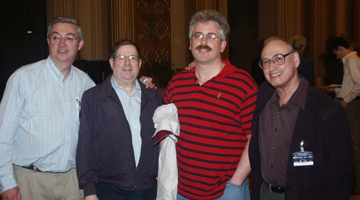| In perhaps the most dramatic
finish in Bermuda Bowl history, USA I gained 12 IMPs on the
last board of the event to emerge with an amazing 204-303
victory over Italy.
The issue was not settled, however, until
an appeals committee had rendered a ruling on a disputed ending
to the final board. In the closed room, Eric Rodwell and Jeff
Meckstroth had gone plus 400 against 4© by Italy’s Norberto
Bocchi and Giorgio Duboin.
In the open room, Paul Soloway had doubled
Lorenzo Lauria in 5¨. If Lauria could get out for down one
– minus 100 – it would be an 11-IMP gain and the
match would be tied.
As play wound down, Lauria had already
lost two tricks and still had the trump ace out against him
– plus the losing ©9 in his hand. With a singleton spade
in his hand, Lauria had played the king from dummy’s
holding of ªK Q to five. Soloway could have cashed the ©10
to guarantee two down, but he played back a spade instead.
Lauria’s partner had left the table
after putting down the dummy, so Lauria was playing the cards
himself. Lauria apparently expected Soloway to cash his winning
heart, so he pulled the ª7 from dummy – which held only
clubs and spades – realizing too late that a spade had
been played. He tried to change his play to the queen, which
would have allowed him to discard the losing heart and get
out for minus 100. Hamman, who had started with the ªJ 10
doubleton, had played the jack to the first lead of the suit,
and he covered the ª7 with the 10.
A tournament director was called, and
the ruling was that the ª7 was a played card, resulting in
two down for minus 300. That gave the Americans a 12-IMP gain
and a 1-IMP victory.
The Italians appealed the ruling, but
the appeals committee, citing rule 45B from the law book,
backed the director. The rule states that when a card is touched
it is played.
In the World Transnational Open Teams,
the Italian Lavazza squad cruised to a win over Zhuang of
China.
|


